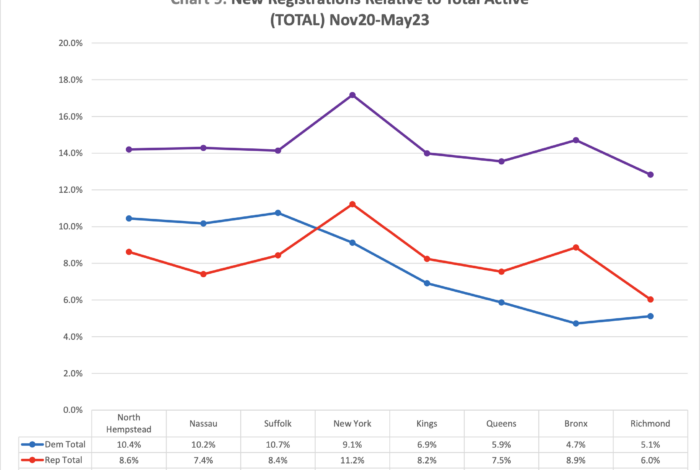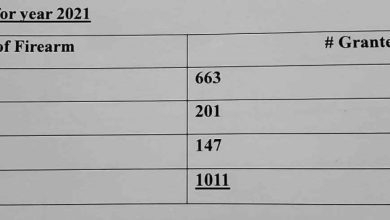New Voter Registration Study shows importance of older voters

The number of newly registered independent voters in New York City and Long Island grew by 14.4% between the last presidential election in November 2020 and May 2023, according to an AARP New York-sponsored analysis of voter rolls by Gotham Government Relations.
New registrations for Democrats and Republicans were only half that, achieving 7.4% and 8% rates of increase, respectively.
The shift away from the two major parties means candidates will increasingly need to appeal to voters 50+, particularly in areas with competitive general elections such as Nassau and Suffolk Counties, and on Staten Island.
Counties with competitive areas like Queens and Kings (Brooklyn) will see candidates jockey more for independent votes. “The growth toward nonpartisan independents was underway in 2015 but substantially accelerated over the last three years,” according to the study.
“The writing is on the wall for candidates: they’ll have to address the issues important to the 50-plus, who are the deciders in most elections – and in particular, to 50-plus independent voters,” said AARP New York State Director Beth Finkel.
The concrete ways voter registration and party membership affect current elections will be on display come the Nov. 7 general election. All 51 City Council districts will vote on new City Council members following what has been an arduous redistricting process.
The election, however, is expected to have historically low turnout. Nevertheless, it means that candidates have the opportunity to recruit voters 50 and older to dominate turnout and drive the campaign energy.
Getting the senior vote will be especially important in hotly contested races such as those occurring in District 47 (south Brooklyn) and District 19 (Queens).
The chaos of redistricting has led to two incumbents, Justin Brannan and Ari Kagan, running in District 47, spanning Bay Ridge to Coney Island. Both candidates were originally elected as Democrats in overlapping districts, but Kagan switched parties, running as a Republican challenger to Brannan.
District 19 in Queens, covering Whitestone, Bayside and Little Neck, is also home to a tight race between incumbent Republican Council Member Vickie Paladino, one of City Hall’s most conservative lawmakers, and former City Council Member and State Senator Tony Avella. The candidates are facing off again after Paladino narrowly defeated Avella in 2021 by a margin of just 400 votes.
Turnout, in these elections, will be critical in both races.
In Suffolk County, there is not a single incumbent running for supervisor of the five Twin Fork towns. Also on the ballot, Suffolk County executive and the county legislators for the Hamptons and the North Fork.
But beyond this year’s election, the trend toward unaffiliated voters in New York will have a major impact on party primaries. In New York, only voters registered with political parties can vote in their party’s primary; independent, third-party or unaffiliated registered voters are left on the outside looking in, but get the final say in the general election.
Identifying without a political party — leaving the option blank — was the leading choice among new registrations, both 50+ and younger voters, in all counties except Suffolk, where the relative growth of 50+ Democrats was slightly more than those opting to remain blank.
“A shrinking base made up increasingly of 50+ voters will further concentrate partisan voting habits and affect the outreach by public officials who are most concerned about winning their party’s primary,” the report says.
New York party primaries only need a plurality to advance to the general election. The demographics of likely voters and those who consistently turnout for elections will yield more power than ever over the selection of primary candidates.
A 2022 AARP survey of independent New York State voters 45 and older found at least 75% of those surveyed find it extremely important that they will be able to stay in their homes as they age, want to be able to get around independently, and want their communities to have high-quality long-term care options.
They also find it important that there are affordable housing options in the area. Other issues they listed as important include protection from consumer fraud, access to high speed internet, affordable health care and prescription drugs, and having Medicare.
Such an active election combined with historically low voter turnout means, as the clock ticks closer to the 2023 general election, candidates will increasingly need to appeal to older voters to drive their desired outcomes.





